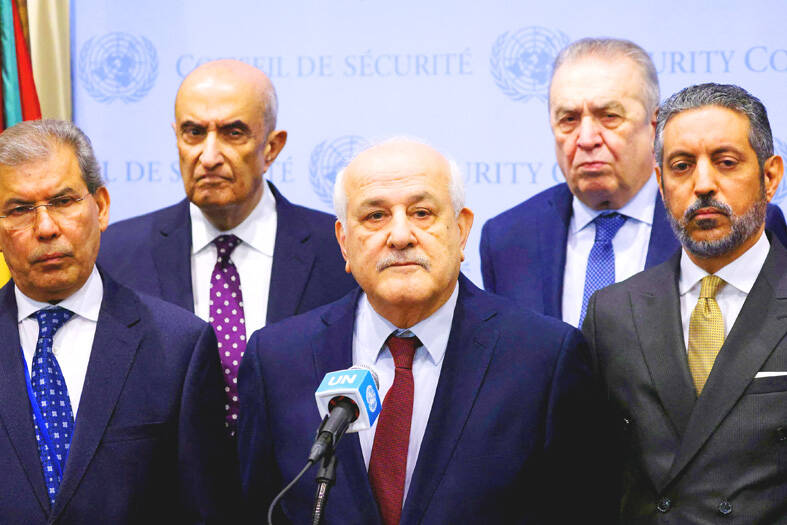Palestinians want the UN Security Council to vote this month on their revived request for full UN membership, despite the US on Wednesday reiterating that Israel and Palestine must first negotiate a peace agreement.
Palestinian Ambassador to the UN Riyad Mansour said that 140 countries recognize the state of Palestine.
“We believe it is high time now for our state to become a full member at the United Nations,” Mansour said.

Photo: Reuters
Palestine is making a fresh bid for UN membership as the war between Israel and Hamas that began Oct. 7 last year nears its sixth month.
Mansour said that during the Cold War between the former Soviet Union and the US, countries were blocked from joining the UN, but they all eventually became members, including North Korea.
The US does not recognize North Korea, but did not block its admission, he said, and asked why conditions should be placed on Palestinian membership.
Palestinian President Mahmoud Abbas delivered the Palestinian Authority’s application to become the 194th member of the UN to then-UN secretary-general Ban Ki-moon on Sept. 23, 2011, before addressing world leaders at the General Assembly.
That bid failed because Palestine failed to get the required support of nine of the Security Council’s 15 members.
Even if it did, the US had promised at that time to veto any council resolution endorsing Palestinian membership, saying this should follow a negotiated peace agreement between Israel and Palestine.
Palestine then went to the 193-member General Assembly, where there are no vetoes, and by more than a two-thirds majority succeeded in having their status raised from a UN observer to a non-member observer state in November 2012.
Mansour on Tuesday asked the Security Council to consider this month the renewed application for membership, which was supported by the 22-nation Arab Group at the UN, the 57-nation Organization of Islamic Cooperation and the 120-member Nonaligned Movement.
He told several journalists on Wednesday that he expects the council’s Standing Committee on New Members, which includes all 15 council nations, to meet behind closed doors to consider the application before the end of the Muslim month of Ramadan on Tuesday next week.
Mansour said he expects the Security Council to vote on the request for full UN membership at its monthly meeting on the Middle East, being held at ministerial level on April 18.
US Department of State spokesman Matthew Miller was asked on Wednesday whether Washington would veto full membership.
“I am not going to speculate about what may happen down the road,” Miller said.
He said that intensive diplomacy has taken place over the past few months to establish a Palestinian state with security guarantees for Israel, which the US supports.
However, he said that should be done through direct Palestinian-Israeli negotiations, “something we are pursuing at this time, and not at the United Nations.”
US Deputy Ambassador to the UN Robert Wood pointed to another obstacle.
The US Congress has adopted legislation “that in essence says that if the Security Council approves full membership for the Palestinians outside of a bilateral agreement between Israel and the Palestinians … [US] funding would be cut off to the UN system.”
“We’re bound by US laws,” Wood said.

ANGER: A video shared online showed residents in a neighborhood confronting the national security minister, attempting to drag her toward floodwaters Argentina’s port city of Bahia Blanca has been “destroyed” after being pummeled by a year’s worth of rain in a matter of hours, killing 13 and driving hundreds from their homes, authorities said on Saturday. Two young girls — reportedly aged four and one — were missing after possibly being swept away by floodwaters in the wake of Friday’s storm. The deluge left hospital rooms underwater, turned neighborhoods into islands and cut electricity to swaths of the city. Argentine Minister of National Security Patricia Bullrich said Bahia Blanca was “destroyed.” The death toll rose to 13 on Saturday, up from 10 on Friday, authorities

OPTIMISTIC: A Philippine Air Force spokeswoman said the military believed the crew were safe and were hopeful that they and the jet would be recovered A Philippine Air Force FA-50 jet and its two-person crew are missing after flying in support of ground forces fighting communist rebels in the southern Mindanao region, a military official said yesterday. Philippine Air Force spokeswoman Colonel Consuelo Castillo said the jet was flying “over land” on the way to its target area when it went missing during a “tactical night operation in support of our ground troops.” While she declined to provide mission specifics, Philippine Army spokesman Colonel Louie Dema-ala confirmed that the missing FA-50 was part of a squadron sent “to provide air support” to troops fighting communist rebels in

Two daughters of an Argentine mountaineer who died on an icy peak 40 years ago have retrieved his backpack from the spot — finding camera film inside that allowed them a glimpse of some of his final experiences. Guillermo Vieiro was 44 when he died in 1985 — as did his climbing partner — while descending Argentina’s Tupungato lava dome, one of the highest peaks in the Americas. Last year, his backpack was spotted on a slope by mountaineer Gabriela Cavallaro, who examined it and contacted Vieiro’s daughters Guadalupe, 40, and Azul, 44. Last month, the three set out with four other guides

Local officials from Russia’s ruling party have caused controversy by presenting mothers of soldiers killed in Ukraine with gifts of meat grinders, an appliance widely used to describe Russia’s brutal tactics on the front line. The United Russia party in the northern Murmansk region posted photographs on social media showing officials smiling as they visited bereaved mothers with gifts of flowers and boxed meat grinders for International Women’s Day on Saturday, which is widely celebrated in Russia. The post included a message thanking the “dear moms” for their “strength of spirit and the love you put into bringing up your sons.” It